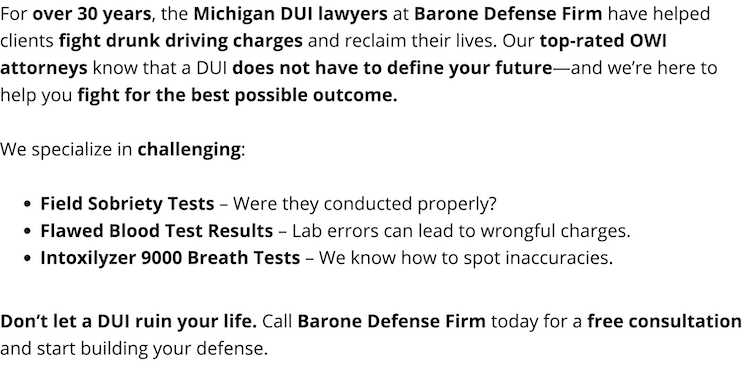OWVI: DUI Michigan Operating While Visibly Impaired vs OWI
The concept of any person driving while impaired is universally known to be a crime. Plus, most people are familiar with being over the "legal limit" when operating a motor vehicle, and what are known nationally as DWI-DUI charges.
Throughout this article, OWI vs DUI Michigan are interchangeable terms. The same goes for driving under the influence (DUI) or DWI (driving while intoxicated). The difference in acronym has more to do with Legislative preferences of language than the reality of what the crime is: drunken driving or drugged driving.
Driving while impaired Michigan. Michigan law distinguishes between intoxicated driving and impaired driving. Generally, a driver is intoxicated if he or she has a BAC (bodily alcohol content) that is over the legal limit.
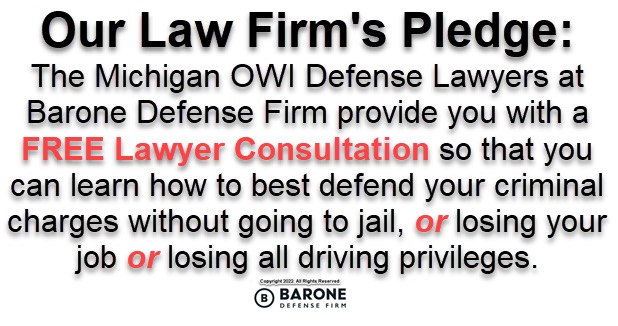
Why am I charged with OWVI? On the other hand, you may be considered "impaired" if your ability to safely operate the vehicle (due to what you ingested or drank) is less than that of a normal, everyday driver. This is referred to as OWVI Michigan.
Impaired driving vs DUI Michigan. In the Great Lakes State [and all other states (except Utah)], the Michigan DUI limit is 0.08 grams percent, for adult age drivers (but not a commercial driver in a big rig truck).
This Michigan drunk driving limit "number" refers to the prohibited level of alcohol content under Michigan drunk driving laws. If a a driver's post-arrest breath alcohol test reveals this "number," she or he will be accused of operating while impaired Michigan.
However, what many people do not realize is that you can also be charged with DUI in Michigan when there is no chemical test at all. If accused of a Michigan operating while impaired offense, you could be convicted of a separate operating while intoxicated Michigan crime known as "OWVI."
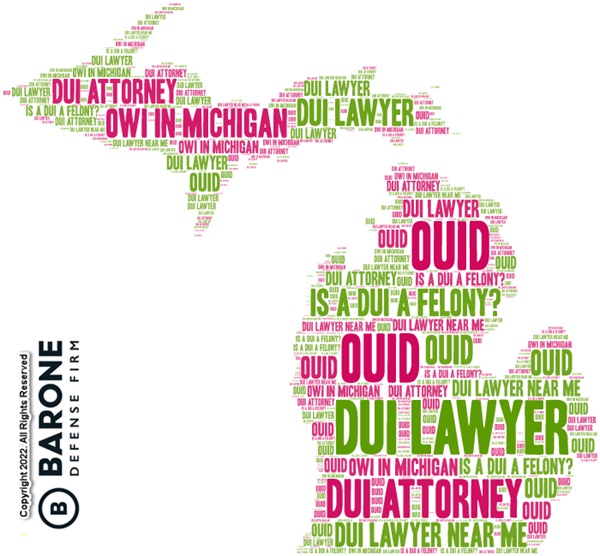
Michigan OWVI vs OWI. So, a person who has a blood alcohol content below the 0.08 grams percent (the presumptively impaired legal alcohol limit in our state) can still violate Michigan DUI laws. To understand why this is possible, it's helpful to understand the various applicable legal definitions.
Impaired Driving vs OWI Michigan: What is Impaired Driving in MI?
The official charge for impaired driving is operating while visibly impaired, or OWVI. It is referred to as "visibly impaired" because the impairment should be noticeable to a normal, everyday person, which is a rather subjective standard.
An OWVI charge is a lesser OWI offense (than an OWI charge Michigan) and is sometimes used to plea bargaining for a less serious crime. The impaired driving probation Michigan "conditions" are more favorable than the OWI penalties Michigan.
The standard of proof for "visibly impaired" is lower than the standard for "under the influence." In an OWVI case, the prosecution must show that the defendant's ability to operate the vehicle was less than that of a careful driver due to the consumption of alcohol, drugs, or a combination of both.
This reduced ability to operate a vehicle safely must have been visible to an ordinary, observant person. You can be convicted of OWVI with a BAC above or below 0.08 gr. %.
OWI Michigan First Offense Penalties for a 1st Offense OWVI Conviction
Like all DUI convictions, a conviction for OWVI has three categories of consequences; (1) punishment imposed by judge, (2) drivers' license sanctions, and (3) other collateral consequences like vehicle immobilization, travel restrictions, job loss, etc. For a first offense operating while visibly impaired (OWVI), you could face a fine of up to $300.00 and must serve 30 days of community service. Case costs will also be imposed as the presiding judge deems to be merited.
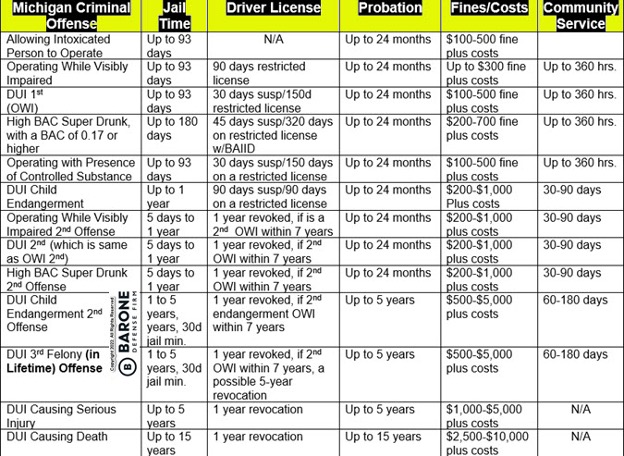
Michigan OWI penalties. On an OWI in Michigan first offense, you can also be sentenced to up to 93 days in jail, and the judge can order as many as 360 hours of community service. You could be required (as a condition of probation) to pay back costs of prosecution and be required to meet with a probation officer monthly and remain on probation for a year or more.
The Secretary of State in Michigan will also suspend your license for 90 days, but during this 90-day period some restricted driving, such as to and from work, will be allowed. Michigan has implemented laws calling for the mandatory use of an ignition interlock device to be able to receive earlier reinstatement of limited driving privileges.
The collateral consequences are the same for an OWVI as for a first offense DUI. Collateral consequences are those things not imposed by the judge or the Secretary of State, but instead, for simply having a criminal conviction on your record.
An OWVI conviction or OWI conviction can impact your ability to keep your job or find new employment. In addition, traveling abroad can be a problem (e.g., in and out of Canada), as well as qualifying for the best rates for life insurance. In some cases, rental housing could be denied to a convicted person.
These collateral consequences and their impact on your life can cause most accused citizens to look for a favorable resolution of their pending case. The key to achieving that goal starts with hiring the best DUI-OWI lawyer available. While a term of probation and driving on a 90-day restricted license may be a big deal, losing your job is a different story.
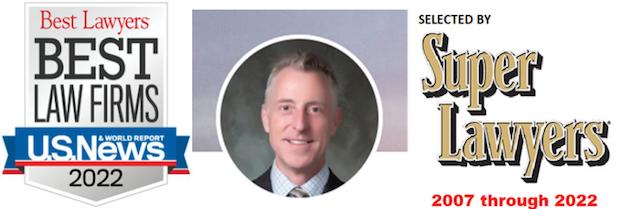
Felony DUI in Michigan: What About OWVI Causing Death or Serious Bodily Injury?
Because a driver can have a breath alcohol reading below the legal limit and still be intoxicated, it is likely that the prosecutor would charge a felony case as an OWI offense rather than an OWVI offense. Intoxicated driving cases resulting in death or grievous bodily injury are serious felony crimes that are punishable by many years in prison.
The "average" prison sentence per death is between five and seven years. If you've been charged with a serious alcohol related crime where death or serious injury has occurred, then be sure to retain top-rated Michigan DUI lawyers for your legal representation.
How a DUI-OWI Lawyer Can Help
Facing drunk driving charges can easily overwhelm you. A DUI or OWI charge is a criminal offense that can impact your life in many ways. The consequences of a drunk driving conviction can include jail time, hefty fines, and a permanent mark on your driving record.
Our criminal defense attorneys specialize in drunk driving cases. The most critical aspect of defending against a DUI-OWI charge is developing a strong defense strategy. Our attorneys will carefully examine the evidence against you, such as:
- Breathalyzer results
- Field sobriety tests
- Circumstances of your arrest
We'll identify any weaknesses in the prosecution's case. By challenging the validity of the evidence or the legality of the traffic stop, we may get the charges reduced or even have them dismissed.
With the right defense strategy, our DUI-OWI lawyers can potentially help keep you out of jail and preserve your driving privileges. If you’re facing drunk driving charges, don’t risk handling it alone. Contact one of our skilled lawyers who can provide the criminal defense you need to protect your future.
How a DUI-OWI Lawyer Can Help
Facing drunk driving charges can easily overwhelm you. A DUI or OWI charge is a criminal offense that can impact your life in many ways. The consequences of a drunk driving conviction can include jail time, hefty fines, and a permanent mark on your driving record.
Our criminal defense attorneys specialize in drunk driving cases. The most critical aspect of defending against a DUI-OWI charge is developing a strong defense strategy. Our attorneys will carefully examine the evidence against you, such as:
- Breathalyzer or blood test results
- Field sobriety tests
- Basis for the traffic stop or police contact
- Lawfulness of warrants obtained
- Witness statements
- Accident reconstruction reports
- Body cam, patrol vehicle and booking room video evidence
- Restaurant or bar receipts
- Photographic evidence
- Police records and training materials
- Medical records and client’s special circumstances
- 911 or police dispatch records
- Circumstances and lawfulness of your arrest
We'll identify any weaknesses in the prosecution's case. By challenging the validity of the evidence or the legality of the traffic stop, we may get the charges reduced or even have them dismissed.
With the right defense strategy, our DUI-OWI lawyers can potentially help keep you out of jail and preserve your driving privileges. If you’re facing drunk driving charges, don’t risk handling it alone. Contact one of our skilled lawyers who can provide the criminal defense you need to protect your future.
Call today to talk with our three Michigan Super Lawyers and receive a free lawyer consultation. Dial us at 1-877-255-6424, 24 hours a day.
 Barone Defense Firm Home
Barone Defense Firm Home
















